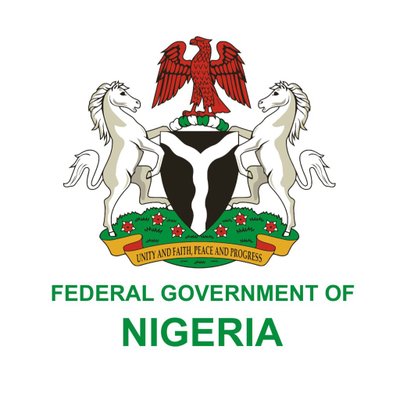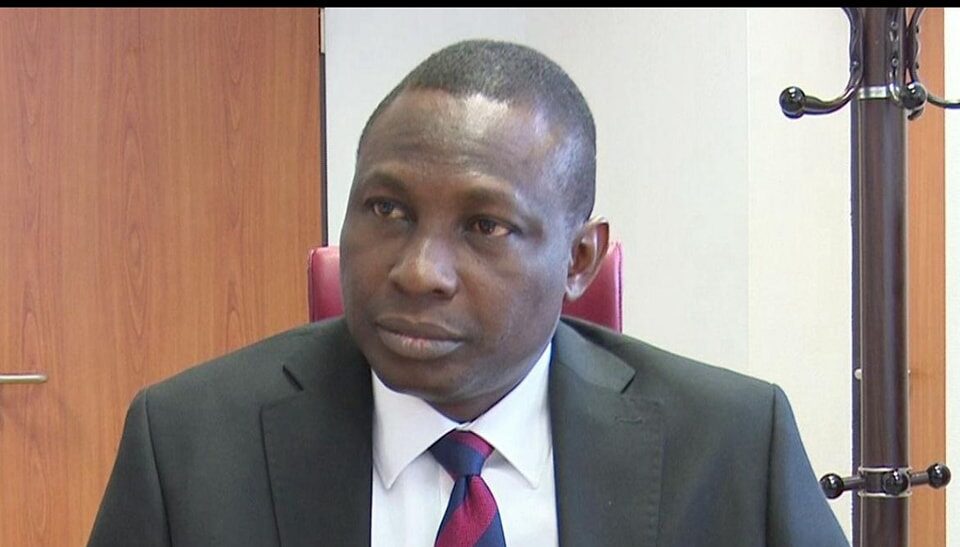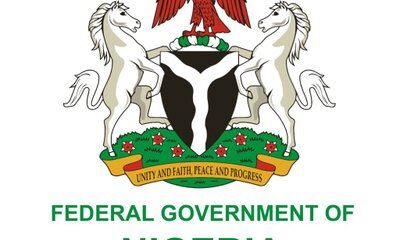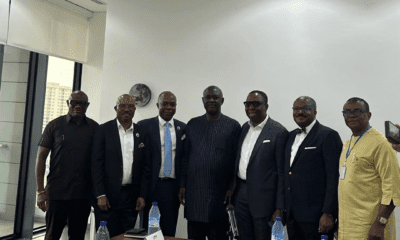Top Story
Six months strike: FG, ASUU adamant, disagree on peace proposals
…As ASUU demands separate salary structure
…Tackles FG over ‘no-work-no-pay’ order
…To lose six months salary for strike period as FG insists ‘no pay’
By Moses Adeniyi
Controversies have clustered around the strike of University Unions as the Federal Government and the Academic Staff Union of Universities (ASUU) remained adamant over issues of contention.
Nigerian NewsDirect gathered that while other matters informing the lingering strike might have been resolved with agreement between the Federal Government and the aggrieved Unions, the issue of payment of the six months salaries of members of the Academic Staff Union of Universities (ASUU) withheld by the Federal Government for the striking period is a major contention which as at the time of filing this report was yet to be resolved.
The Federal Government, it was gathered, stood the ground not to shift from its declared ‘no-work-no-pay’ order, stating it would not pay the lecturers for the six month period they have embarked on the strike, as a penalty for their actions.
…ASUU rejects salary structure
Meanwhile, ASUU, in turn on Thursday explained that its meeting with the Prof. Nimi Briggs-led committee last Tuesday, ended in deadlock because the committee presented “award of a Recommended Consolidated University Academic Salary Structure (CONUASS), prepared by the National Salaries, Incomes and Wages Commission” which was unsatisfactory to it.
ASUU in a press statement, made available to journalists on Thursday, by its President, Prof. Emmanuel Osodeke, argued the ‘award salary’ was “against the principle of collective bargaining, based on the Wages Boards and Industrial Council’s Decree No 1 of 1973, the Trade Dispute Act (1976), ILO Conventions 49 (1948), 91(1950), 154 (1988) and recommendation 153 (1981), Udoji Commission Report of 1974, and Cookey Commission Report of 1981.”
The report, ASUU noted, “also provided a platform for resolving such important issues as special salaries and conditions of service of university staff, university funding, roles of Pro-Chancellors, Vice-Chancellors, and National Universities Commission (NUC).
“A key outcome was a special salary scale for university staff known as University Salary Structure (USS).”
ASUU alleged that the Federal Government was insincere in its approach to resolving the lingering crisis in the university academic system, demanding that “The Federal Government, through the Ministry of Education, return to the New Draft Agreement of the 2009 FGN/ASUU Renegotiation Committee, whose work spanned a total of five and half years as a demonstration of good faith.”
The union further argued that the “award” presented by the Nimi Briggs-led Team appeared in a manner of “take-it-or-leave-it on a sheet of paper,” noting that “no serious country in the world treats their scholars this way.”
In the statement, tagged “Why ASUU Rejects Governments Award of Salary,” the union claimed that “Government imposed the ongoing strike action on ASUU and it has encouraged it to linger because of its provocative indifference.”
“The Munzali Jibril-led renegotiation committee submitted the first Draft Agreement in May 2021 but government’s official response did not come until about one year later!
“Again, the ‘Award’ presented by the Nimi Briggs-led Team came across in a manner of take-it-or-leave-it on a sheet of paper. No serious country in the world treat their scholars this way.
“Over the years, particularly since 1992, the Union has always argued for and negotiated a separate salary structure for academics for obvious reasons.
“ASUU does not accept any awarded salary as was the case in the administration of General Abdulsalam Abubakar.
“The separate salary structures in all FGN/ASUU Agreements were usually the outcome of collective bargaining processes. ‘Leaking economy.’
“The major reason given by the Federal Government for the miserly offer, paucity of revenue, is not tenable.
“This is because of several reasons chief of which is poor management of the economy. This has given rise to leakages in the revenue of governments at all levels.
“There is wasteful spending, misappropriation of fund and outright stealing of our collective patrimony.
“ASUU believes that if the leakages in the management of the country’s resources are stopped, there will be more than enough to meet the nation’s revenue and expenditure targets without borrowing and plunging the country into a debt crisis as is the case now,” it argued.
ASUU noted that “at the commencement of the renegotiation of the 2009 FGN/ASUU Agreement on 16th March 2017, both the Federal Government and ASUU Teams agreed to be guided by” some terms of reference, but the Federal Government reneged on its side to abide by the agreement.
It warned that, “Government’s surreptitious move to set aside the principle of collective bargaining, which is globally in practice, has the potential of damaging lecturers’ psyche and destroying commitment to the university system.
“This is, no doubt, injurious to Nigeria’s aspiration to become an active player in the global knowledge industry,” ASUU argued.
…FG insists “no-work-no-pay”
Meanwhile, the Federal Government on Thursday insisted that it will not yield to the demand by ASUU for their members to be paid the six months salaries withheld over the ongoing strike, saying it is meant to be the penalty for their action.
The Minister of Education, Adamu Adamu, at the 47th session of the State House Ministerial Media Briefing organised by the Presidential Communications Team at the Aso Rock Villa, Abuja, said not paying the backlog will serve as deterrence for others who may contemplate strike in future.
He said that other three university based unions that are on strike have accepted to call off the strike in the next one week, except ASUU that has remained adamant insisting that its members should be paid the five months that their salary was stopped.
According to him, ASUU had begun consultations with their members to determine whether to call off their strike as well.
“All contentious issues between the government and ASUU had been settled except the quest for members’ salaries for the period of strike to be paid, a demand that Buhari has flatly rejected,” Adamu mentioned.
Adamu argued that ASUU went on strike despite the huge investment of trillions of naira that President Buhari regime and agencies such as TETFUND and UBEC in education, hence would have to bear the consequences, mentioning that the demand for payment for the strike period was not tenable as President Muhammadu Buhari has flatly rejected same.
According to him, the insistence by ASUU on being paid six months salaries for the strike period is the only issue of contest stalling the negotiations between the Federal Government and the union.
“If you think it is for the government other than what the government is doing in the university to stop strike, the standard government has taken now is not to pay the months in which no work was done.
“I think this is the only thing that is in the hands of government to ensure that there is penalty for some behaviour like this.
“So, I believe teachers will think twice before they join strike if they know that at the end they are not going to be paid and the federal government is not acting arbitrarily.
“Before, it was some magnanimity on its part, there is a law which says if there is no work, there will be no pay.
“I believe this will be a very strong element that will be determining from going on strike,” the Minister said.
Adamu also stated that all other unions including the Senior Staff Association of Nigerian Universities, (SANNU), Non-Academic Staff Union of Education and Associated Institutions, (NASU) and the National Association of Academic Technologists (NAAT) will resume work in the next one week.
The Minister further dismissed media report that President Muhammadu Buhari gave him two-week ultimatum to resolve the misunderstanding between ASUU and the Federal Government.
Adamu informed that the University Peculiar Personnel and Payroll System, U3PS, and the University Transparency Accountability Solution (UTAS) outscored the Integrated Personnel Payroll and Information System (IPPIS) during the integrity tests conducted by NITDA, affirming that ASUU’s peculiarities will be accommodated in whatever platform that may me adopted.
He further said that currently, the IPPIS has been made to accommodate the issue of sabbatical for lecturers, while debunking the report that UTAS had not been approved by government as the payment platform for University teachers.
He said that the government has proposed a new salary to the unions which he said SSANU, NASU, and NAAT have accepted in principle.
He, however, commended the Academic Staff Union of Polytechnics for calling off its own strike.
…We have spent over N6trn on education in seven years – FG
Adamu further claimed that the Federal Government had spent over N6 trillion on revamping the country’s education sector in the last seven years.
According to him, the money was spent on the provision of infrastructure and Information Communication Technology equipment to public institutions of learning across the country.
“The implementation of the sector’s blueprint is on course. In the last seven years, we have undertaken massive physical development of infrastructure, ICT development at all levels of our educational system, established new institutions, improved the carrying capacity of our institutions and expanded access to quality education at all levels.
“Steps are also being taken to accelerate the implementation of the 2020 presidential approval for the revitalisation of the teaching profession.
“The government of President Buhari has expended a total of N6,300,947,848,237 on capital and recurrent expenditure in the education sector in the last seven years,” he said.
The minister pledged that the government would continue to improve on the implementation of its strategic plans as well as create the necessary environment for the overall development of the education sector in Nigeria. Adamu argued that each state of the federation could now boast of at least a federal university and polytechnic.
“This administration has ensured that all states of the federation now have a federal university and a federal polytechnic, with nine universities, nine polytechnics and six colleges of education established between 2018 and today.
“This administration is determined to ensure that they take off very well that is why provisions have been made for all of them,” he said.
Adamu highlighted that the basic and secondary level of education had also received attention in the current administration, with about N553 billion spent in the process.
“…take ASUU to court” for damages — FG tells students
Adamu argued it was duty bound on ASUU to compensate the affected students for the time wasted for the over six-month ASUU strike.
According to him, the Federal Government bears no liability to compensate the students for loss of time for the over six months period which the strike has lasted, stating that if the students are determined to get compensated, they should “take ASUU to court,” for damages incurred over the strike period.
Recall that ASUU had since February 14, 2022 embarked on an indefinite strike over unresolved differences with the government. The union had accused the government of failing to honour and implement the Memorandum of Understanding and Memorandum of Action signed between both parties in 2020 — an agreement that was reached to end a nine-month old strike by ASUU in 2020.
Other issues of contention include the government’s poor commitment to the payment of academic earned allowances and the continued use of the Integrated Personnel Payroll Information System (IPPIS). Also, include the grievances of the academic stakeholders over the refusal of the government to adopt the Universities Transparency and Accountability Solution, as its recommended substitution for IPPIS, and the proliferation of universities in the country. Grievances by other stakeholders in the nation’s public university system had seen more unions including NAAT, SSANU and NASU, subsequently joining up in the strike.
Top Story
Hardship: FG kicks off N100bn consumer credit scheme


…Civil servants to benefit in first phase
By Grace Olatundun
The Federal Government of Nigeria has kicked off the N100 billion Consumer Credit Scheme for Nigerians as a tool to alleviate the escalating economic hardship in the country.
In a press statement on Wednesday by the President’s spokesperson, Ajuri Ngelale, he disclosed that interested Nigerians are expected to visit the portal of Nigerian Consumer Credit Corporation before May 15, 2024.
The President noted that the “consumer credit serves as the lifeblood of modern economies, enabling citizens to enhance their quality of life by accessing goods and services upfront, paying responsibly over time. It facilitates crucial purchases, such as homes, vehicles, education, and healthcare, which are essential for ongoing stability and the pursuit of their aspirations.
“Individuals build credit histories through responsible repayment, unlocking more opportunities for a better life. The increased demand for goods and services also stimulates local industry and job creation.”
The President stated further that every hardworking Nigerian should have access to social mobility, with consumer credit playing a pivotal role in achieving this vision.
“The Nigerian Consumer Credit Corporation (CREDICORP) achieves its mandate through the following: Strengthening Nigeria’s credit reporting systems and ensuring every economically active citizen has a dependable credit score. This score becomes personal equity they build, facilitating access to consumer credit, Offering credit guarantees and wholesale lending to financial institutions dedicated to broadening consumer credit access today and Promoting responsible consumer credit as a pathway to an improved quality of life, fostering a cultural shift towards growth and financial responsibility.
“In line with the President’s directive to expand consumer credit access to Nigerians, the Nigerian Consumer Credit Corporation (CREDICORP) has launched a portal for Nigerians to express interest in receiving consumer credit.
“This initiative, in collaboration with financial institutions and cooperatives nationwide, aims to broaden consumer credit availability.
“Working Nigerians interested in receiving consumer credit can visit www.credicorp.ng to express interest. The deadline is May 15, 2024.
“The scheme will be rolled out in phases, starting with members of the civil service and cascading to members of the public,” the statement read.
Recall that two months ago, a presidential spokesman, Bayo Onanuga, announced that the Federal Executive Council had given the nod for the establishment of the Consumer Credit Scheme.
He said the President’s Chief of Staff, Femi Gbajabiamila, will lead a committee that includes the Budget Minister, Attorney-General, and Coordinating Minister of the Economy and Finance to make the scheme a reality.
In March, the Chairman of the Federal Inland Revenue Service Chairman, Zacch Adedeji, said the Nigerian government would unveil its proposed N100 billion consumer credit loan in a few days.
Top Story
EFCC goes after PtoP operators, hands over 14 forfeited properties to Enugu Govt


The Economic and Financial Crimes Commission (EFCC) has commenced a clampdown on users of Peer to Peer platforms for foreign exchange transactions.
Speaking at a meeting with media executives in Abuja on Tuesday, Chairman of the EFCC, Mr Ola Olukoyede disclosed that the EFCC, in its bid to ensure the safety and stability of the foreign exchange market, has uncovered a new fraudulent scheme called P to P (peer to peer) trading scheme.
The platform, according to him, is operating outside the official banking and financial corridors with more than 300 (three hundred) accounts linked to it already frozen by the EFCC.
He reaffirmed the commitment of the Commission to the economic growth and development of the country, promising that the EFCC would not relent in the exercise of its mandate.
He also revealed that the Commission has recovered more than N120 billion from fraudsters within six months and secured more than 1300 convictions.
Meanwhile, the EFCC has also handed over 14 properties initially forfeited to the Federal government to the government of Enugu State.
The transfer of the properties to Enugu State governor, Dr Peter Mba was performed by the EFCC Chairman at the corporate headquarters of the Commission.
Speaking before the brief handover ceremony, Olukoyede who disclosed that the road to the forfeiture dated back to 2007, stated that event spoke of the mutually beneficial relationship existing between the federal government and states.
“What we are witnessing today testifies to a symbiotic relationship that should exist between the federal government and the state governments. The essence of our meeting here today is for us to handover properties that were forfeited to the federal government, which of course belong to Enugu State people back to the people. It shows that governance can work in Nigeria. Our people deserve the benefits of good governance and that is what is being evidenced here today.”
Speaking further, he said, “If you look at the history of this particular matter, it takes us back to 2007 when we started the prosecution. So we are looking at about 17 years since the matter has been on.
“Eventually some of the properties were forfeited and since then, the EFCC has been managing those properties even though the titles of quite a number of the properties have been revoked by the Enugu State government. What we are witnessing here today is the official handing over of the properties to the people of Enugu State through His Excellency, Dr Peter Mba,” Olukoyede said.
Earlier in his remarks, Governor Ubah expressed gratitude for the handover and thanked the EFCC chair and the Commission for ensuring that the people of his state reclaimed their common patrimony.
“I would like to express my profound gratitude for the event we are witnessing today. The importance and significance of this event can never be lost on us and we do not also take it for granted.
“So I want to take this opportunity to convey my profound gratitude and deep appreciation to the chairman and members of the EFCC team that have brought us to where we are today.
“This is a journey that began several years ago and we are marking a formal closure to that journey here today. A journey that saw the successful prosecution of certain companies in possession of assets belonging to the people of Enugu State.”
The Governor who noted that the properties were forfeited not to his state but to the federal government expressed gratitude to President Bola Tinubu for making it possible for them to be returned to the government and people of Enugu State.
“Those assets were forfeited to the federal government. And this brings me to another gratitude that I want to convey here today. I want to acknowledge and recognise the important role played by the President, His Excellency Bola Ahmed Tinubu.
“Without the proactiveness and speed at which he acted on our request to cede these assets back to the people and government of Enugu State, we wouldn’t have been here today. So I want to thank him most sincerely for granting our request for these assets that were forfeited to the federal government to be ceded back to Enugu State.”
He lauded Olukoyede’s initiatives at making the EFCC a strong institution and cautioned against attempts by some individuals to distract the Commission.
“I will not end this remark without acknowledging the work the EFCC chairman is doing in strengthening this very important institution. It is important that we do not weaken our institutions.
“Whatever we do in governance is transient. So I want to commend him for the efforts he is making in ensuring that this very important institution, the EFCC is strengthened. Thank you very much for all the great work you and your team are doing and particularly for the effort that you have put in to make today a reality,” the Governor stated.
The properties comprise houses, transmission equipment for radio and television stations, a building for medical operations, among others.
Top Story
MRS considers voluntary delisting from NGX, to hold EGM


The management of MRS Oil Nigeria Plc is considering voluntary delisting from the Nigerian Exchange.
The company has called for an Extraordinary General Meeting (EGM) to make the decisions on the share buyback and voluntary delisting.
The EGM is scheduled to hold at the Civic Centre, Ozumba Mbadiwe Avenue, Victoria Island, Lagos, on May 21, 2024, at 11:00 am according to a corporate disclosure made by the company.
The corporate disclosure reads that the company will meet to transact the following special business:
“To consider, and if thought fit, pass, with or without modification, the following sub-joined resolutions as special resolutions:
“That the voluntary delisting of all the Company’s issued shares from the daily official list of Nigerian Exchange Limited (the ‘Voluntary Delisting’) be and is hereby approved on such terms and conditions (including but not limited to the timing of implementation, arrangements for dissenting shareholders (if any) and the fulfilment of specific conditions precedent to effectiveness (if any), that the Board of Directors of the Company deems appropriate in connection with the Voluntary Delisting; and subject to obtaining all requisite regulatory approvals.
”That the Memorandum and Articles of Association (“MemArts”) of the Company be and are hereby amended to authorize the Company to undertake a share buyback and share capital reduction.
“That the Company be and is hereby authorised to undertake a share buyback and share capital reduction in connection with any of its issued shares that may be purchased from dissenting shareholders where necessary as a consequence of the Voluntary Delisting; on such terms and conditions, in such volumes and at such times as the Board deems fit; subject to, and in accordance with, applicable laws and regulations.
“That the company’s MemArts be amended upon completion of the share buyback and share capital reduction to reflect the updated share capital.
“That upon conclusion of the Voluntary Delisting, and whilst the Company remains a public limited liability company, the Board be and is hereby authorised to take all such action as may be required to admit the Company’s shares on the NASD OTC Securities Exchange to ensure that dealings in the Company’s shares are implemented in accordance with the Securities and Exchange Commission’s Rules on Trading in Unlisted Securities.
“That the Board be and is hereby authorised to take all such lawful actions and steps (including but not limited to entering into/executing such agreements and documents, appointing professional advisers and other parties, and complying with directives of any regulatory authority) deemed necessary to give full effect to the above-referenced resolutions.
“That the Company Secretary be and is hereby authorised to make all such filings, take all necessary lawful actions and/or steps to give effect to the above-referenced resolutions and comply with all relevant regulatory requirements.
“A member of the Company entitled to attend and vote at the EGM is entitled to appoint a proxy in his/her/its stead. A proxy need not be a member of the Company. It is important to ensure that all proxy documents are properly stamped by the Commissioner of Stamp Duties and deposited at the Registrar’s Office, First Registrars and Investor Services before the EGM commences.”
-
Finance3 months ago
Court orders Sen. Victor Umeh to repay N136m bank debt to AMCON
-



 Abuja Update2 months ago
Abuja Update2 months agoUNDP, FG partnership needed to achieve inclusion, equity- Minister
-
Abuja Update1 month ago
Banks drive stock market performance with N147bn gain
-



 Infotech3 weeks ago
Infotech3 weeks agoWorld Backup Day: NITDA urges Nigerians to ensure backup of data
-
capital market2 years ago
Rt.briscoe, FBNH, Others halts negative performance of stock market
-



 Health3 weeks ago
Health3 weeks agoImmunisation: FG, GAVI seek synergy with Sokoto Govt.
-
Infotech2 weeks ago
Forex for Beginners: Unveiling the currency exchange and how to trade it
-



 Health1 week ago
Health1 week agoCapacity training will reduce migration of health workers- NPHCDA
















